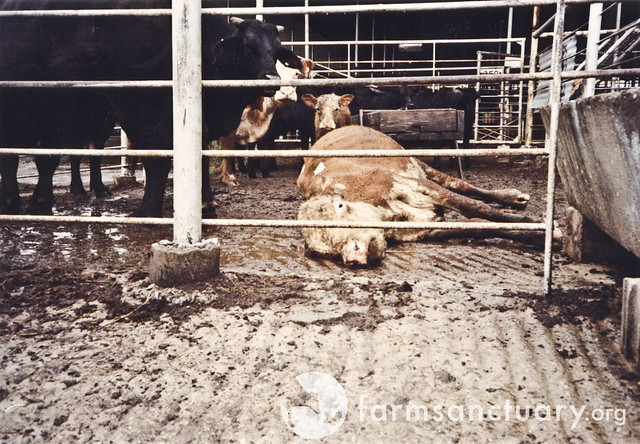Update, 12.37 p.m.: Just as I posted this report, and one day after the case made headlines, The Salt Lake Tribune reported that Draper city prosecutors have dismissed the case today.
Industrial Agriculture has found its first “ag-gag” target — 25-year-old Amy Meyer.
 Photo courtesy Farm Sanctuary
Photo courtesy Farm Sanctuary
A file photo of a downed cow left to die at an Oklahoma stockyard as her frightened young calf looks on. Animal welfare advocates say this kind of abuse is pervasive in industrial farming facilities.
Meyer has been charged with a Class B misdemeanor for allegedly using her cell phone to film operations at a meat packing facility in Draper, Utah on February 8. If found guilty of “agricultural operation interference,” she faces up to six months in jail.
Meyer, an animal welfare advocate, says she went by the Dale T. Smith and Sons Meat Packing Co facility because she had heard reports that anyone standing on the public road nearby could witness the terrible way the workers there treated the livestock. She says she filmed the facility from the public sidewalk and didn’t trespass on the property. From her public statement:
“What I saw was upsetting, to say the least. Cows being led inside the building struggled to turn around once they smelled and heard the misery that awaited them inside. I saw piles of horns scattered around the property and flesh being spewed from a chute on the side of the building. I also witnessed what I believe to be a clear act of cruelty to animals – a live cow who appeared to be sick or injured being carried away from the building in a tractor, as though she were nothing more than rubble.
“At all times while I documented this cruelty, I remained on public property. I never once crossed the barbed wire fence that exists to demarcate private and public property. I told this to the police who were on the scene.
I am shocked and disappointed that I am being prosecuted by Draper City simply for standing on public property and documenting horrific animal abuse while those who perpetrated these acts are free to continue maiming and killing animals.
“It is my understanding that the Mayor of Draper co-owns this slaughterhouse.”
The slaughterhouse is indeed co-owned by Draper mayor Darrell H. Smith. And according to this Salt Lake Tribune report, the judges in the Draper Justice Court are appointed by the mayor with the advice of the city council.
We’ve been reporting for a while (see here and here) about the series of proposed ag-gag bills that seek to criminalize independent, undercover investigations of factory farms. At least 25 such bills have been proposed in different states since 2011. (Ten were introduced in state legislatures this year) So far most of the bills have either failed or face stiff opposition from animal welfare activists and government accountability advocates. Only two bills — in Utah and Iowa —have been signed into law. Tennessee might be next in line. Its ag gag bill was passed by both houses of legislature earlier this month, but Governor Bill Haslam is yet to sign it into law.
These bills are part of Big Ag’s continuing efforts to stem the flow of undercover videos and photos of industrial-scale livestock operations that have repeatedly exposed unsanitary conditions and inhumane treatment of animals. Exposés by Mercy for Animals, the Humane Society of the United States, and PETA (People for the Ethical Treatment of Animals) have led to the closure of farming facilities, nationwide meat and egg recalls and, in some cases, criminal convictions.
Most of the latest round of bills introduced this year require that anyone recording abuse in agricultural or industrial operations turn the evidence over to law enforcement within 24 to 48 hours or face criminal charges.
Merritt Clifton, editor of Animal People, says this is the most insidious aspect of ag-gag legislation. “Immediately reporting abusive incidents would preclude documenting the extent to which they are a pervasive pattern, ignored if not actually condoned or even encouraged by management,” Clifton wrote in an email. “In addition, immediately reporting potentially illegal abuses would expose the identity of the undercover operatives — which is exactly what the meat industry wants: to identify and exclude any employees who might expose not only overt abuses, but also the routine abuse that is inherent in practices such as macerating alive the newly hatched males of egg-laying poultry breeds, and castrating and clipping the teeth of piglets without anesthesia.”
Back in Utah, Meyer has pleaded not guilty to the charge against her. Her next court appearance is on May 23. Meyer’s case is a clear example of how these laws can act as a silencing tool, intimidating potential whistleblowers from speaking out. It violates the public’s right to know about how the food that reaches our tables is produced and to make informed food choices.
We don’t have a paywall because, as a nonprofit publication, our mission is to inform, educate and inspire action to protect our living world. Which is why we rely on readers like you for support. If you believe in the work we do, please consider making a tax-deductible year-end donation to our Green Journalism Fund.
Donate